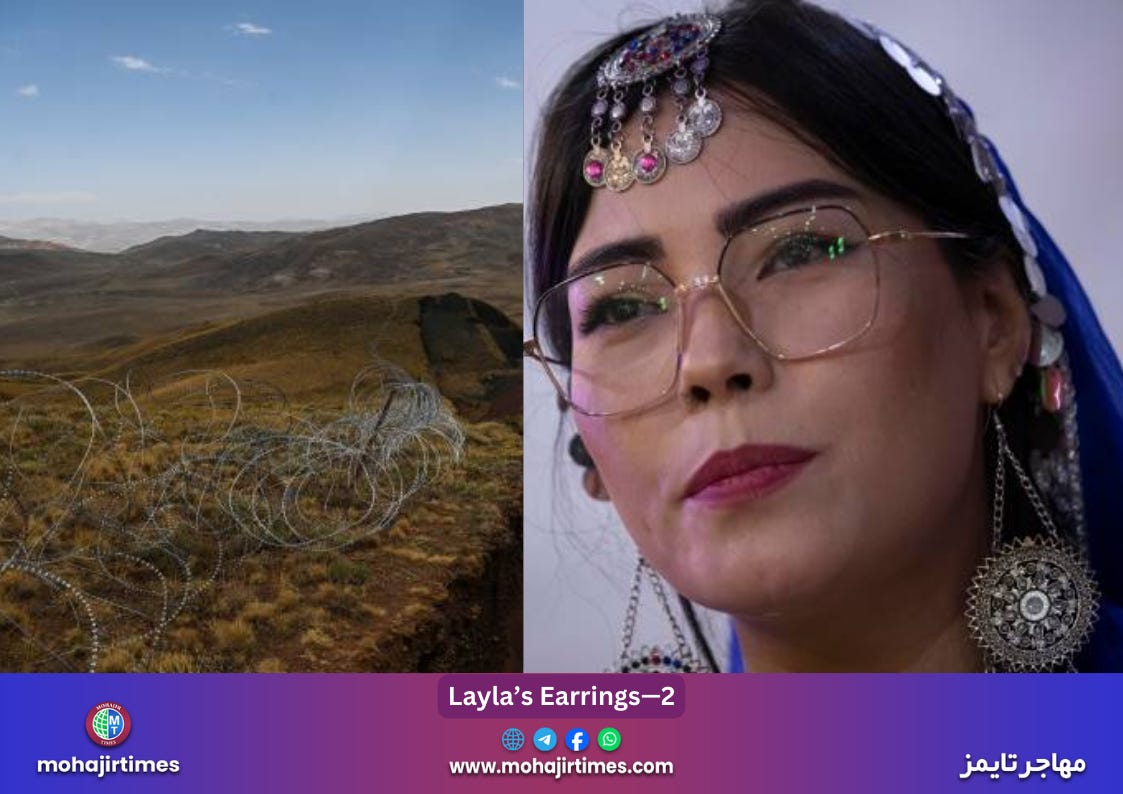Layla’s Earrings—2
I had barely risen to my feet when a scream rang out from atop the wall, followed by a body falling to the ground. I turned back—she was Layla, her face and head stained with blood
By: Khan Mohammad Hedayat
I said, “I’m truly sorry. In a sense, we all share the same fate—a generation that the more we build, the more we burn and turn to smoke.” She wiped her tears with the corner of her veil and, sobbing, continued: “We were at the office on duty when suddenly armed men with covered faces, their long beards and filthy hair peeking out from under their turbans, stormed in. They searched every room and took several colleagues, including young men and women, with them.
They sexually assaulted some of the women, while a few of us managed to escape. As they whipped the women, they shouted that no woman in Afghanistan would ever be allowed to leave home without a male escort. Now, I have to flee far away forever because my identity has been exposed to them. They are searching for me. If they catch me, who knows what grim fate awaits me and my family. For now, at least, I might be able to survive somewhere on this earth for a few more days.
My life is in danger, yet no human rights organization pays attention to our cries.” I asked why? She replied, “Because we are the oppressed and downtrodden of history. Haven’t you realized that the poor and the victimized are always trampled underfoot?” I nodded in agreement. She then concluded her words with these sentences: “Now, by any means necessary, I must escape this storm. Remember, the world belongs to tyrants and bullies.”
We were busy preparing for our journey when suddenly, a voice echoed through the hallway. It was the boss. In his gruff and commanding tone, he ordered everyone to get ready to move. The people in the room for singles were the first to step out. A few minutes later, we followed. We walked down the corridor to the gate at the end of the alley. Three-wheeled rickshaws were lined up in a row, ready to transport passengers. Each rickshaw carried twice its standard capacity, about fifteen people. At sunset, far from the city, we disembarked in a dark, desolate plain filled with soft sand and mountain trees.
For a moment, we lay down among the trees. The night was pitch black, but the moonlight still lent us a faint glow. The smuggler, who introduced himself as our guide, quietly asked everyone to keep walking for another two hours. I suddenly noticed the large crowd around me emerging from the shadows of the trees—men, women, and even small children. Since I was with family, it was easier for me to walk, and I grew less tired. We ran less and stumbled upon sharp thorns and steep hills only once or twice. My group, which consisted of 24 people out of at least 650, had Layla as its leader due to her military experience.
Layla led the way, and we followed her. After a little more than two hours of walking, we reached the base of a hill covered with forests. Two guides were leading the crowd—one at the front of the line and the other at the back. The first guide stopped and quietly asked everyone to sit down. The crowd gathered around. Then, pointing toward a narrow trail disappearing into the woods, he asked the second guide to go ahead and check the area. The second guide returned moments later and informed his colleague that the area was clear and safe.
Layla led the way, and we followed her. After a little more than two hours of walking, we reached the base of a hill covered with forests. Two guides were leading the crowd—one at the front of the line and the other at the back. The first guide stopped and quietly asked everyone to sit down. The crowd gathered around. Then, pointing toward a narrow trail disappearing into the woods, he asked the second guide to go ahead and check the area. The second guide returned moments later and informed his colleague that the area was clear and safe.
It was decided that one group would cross the border first, followed by the next, and so on. The first group left. Shortly after, the second group, which included us, was called forward. We navigated the narrow trail through rocks and forests until I noticed a tall, solid wall stretching endlessly in both directions. The wall was about three meters high, topped with barbed wire. Border guard towers stood 500 meters apart. Two wooden ladders were placed on the wall between the towers.
One by one, people climbed the ladders, placed there secretly by human traffickers, and crossed the wall under the barbed wire. I climbed one of the ladders and squeezed through an opening under the barbed wire, throwing myself down on the other side. I had barely risen to my feet when a scream rang out from atop the wall, followed by a body falling to the ground. I turned back—she was Layla, her face and head stained with blood. I had no time to stop.
I started running with the crowd fleeing behind me. Gunfire erupted from all sides. It felt as if bullets rained from the sky while people sprang from the earth. Everyone scattered, running in every direction. After nearly ten minutes of running, I collapsed under a lone tree, lying flat on my back amidst the dirt and sand.
The sound of gunfire subsided. My companions arrived one by one, falling to the ground. Layla was the last to come, her head and neck covered in blood, accompanied by her sister Nilofar. Layla had lost half of her right ear—her earrings had caught on the barbed wire as she jumped over the wall, tearing part of her ear off and leaving it behind in the border.
Layla’s cries of pain had alerted the guards and triggered the shooting. Layla and her sister made it, but she left her ear behind as a keepsake on the border wall—a memento of a young, educated Afghanistani migrant woman. She came, but there was still no news of her parents. Perhaps a bullet had lodged itself in the guesthouse of their hearts, leaving them, too, as a memory at the border. The End








